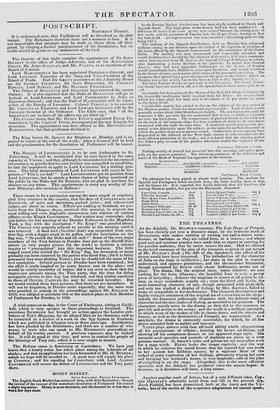THE THEATRES.
Ar the Adelphi, Mr. BULWER'S romance, The Last Days of Pompeii, has been cleverly put into a dramatic shape, by the dextrous hand of BUCKSTONE, who makes nothing of turning out half-a-dozen melo- dramas, or barlettas as they are called here, in a season ; and whose good tact and constant practice have made him so expert at catering for his peculiar audience, that he never misses his aim. Had he adhered to the brief summary of the plot of the romance, as given in our review of Mr. BULWER'S book ( No. 329 of the Spectator), the effect of the drama would have been improved. The introduction of the character of Julia on the stage is ineffective ; her share in the plot is scarcely understood, and appears gratuitous; and the she-monster Stratonice, though personated by REEVE with chaste buffoonery, seems out of place. The drama, like the original story, wants interest : we care nothing for the hero, Glaucus ; the beautiful Tone is only a pretty piece of insipidity ; Arbaces the magician is armed at all points in vil- lany, as stage scoundrels usually are ; even the blind girl Nydia, the most interesting character of any, though personated with great skill, and only too studied a display of feeling, by Mrs. KEELEY, failed to make us sympathize in her misfortunes. The eloquent descriptions and highly-wrought sentiment of the original are of course lost on the stage : indeed, the dramatist judiciously dispenses with the delicate traits of character and the nice shades of feeling, as unsuited to his purpose. The characters merely serve in the drama, as they did in the romance, to give life and action to the scenes ; and the result is a brilliant spectacle, in which some of the modes of life in classic times, and the streets and houses, as well as the destruction of Pompeii, are represented. As a spectacle, the drama is eminently successful; for which, be all due praise accorded both to author and manager. YATES plays Arbaces with that off-hand ability which characterizes all his personations of villains ; knitting his brows ad libitum, and showing off his sumptuous dresses in the approved stage style. His sarcastic aside speeches and avowals of duplicity are given in a very genuine manner. 0. Smern's voice and person are too masculine even for a stage witch. REEVE looks the virago capitally : and the way in which he enforces the moral lesson that the injured fair one reads to her patient but faithless spouse, by a vigorous blow of the cudgel at every expression of her feelings, alternately wiping her eyes and breaking her husband's bones, is very laughable—old as the joke of cudgelling is on the stage. Altogether, this is the most effective spectikle that the Adelphi has produced since the season began : it deserves, as it doubtless will have, a long career.


















 Previous page
Previous page